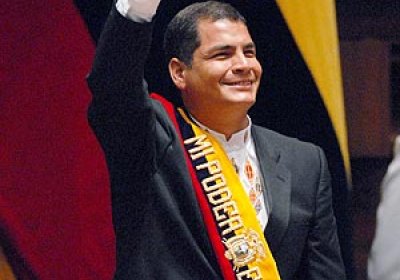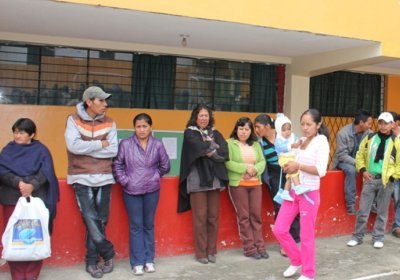Ecuador: Correa says Latin American left faces 'new Cold War'
Ecuadorian President Rafael Correa said on August 5 that left-wing governments in Latin America are facing “a new Cold War” that seeks to “annihilate them” through strategies of political destabilisation.
The statements of the socialist leader come as opposition groups, including many from the far right, are planning a new series of protests against his government.
Ecuador
 Colombian Indigenous refugees in Ecaudor.
Migrant rights bill says 'no one is illegal'
Ecuadorian National Assembly deputy Esteban Melo said that under a new migration bill presented to the Ecuadorian National Assembly on July 16, “No human being will be considered illegal”.
Colombian Indigenous refugees in Ecaudor.
Migrant rights bill says 'no one is illegal'
Ecuadorian National Assembly deputy Esteban Melo said that under a new migration bill presented to the Ecuadorian National Assembly on July 16, “No human being will be considered illegal”.
 Supports of the 'no' vote celebrate in Athens on the night of July 5.
Leaders of Latin American left-wing governments have congratulated the Greek government and its people after Greece's historic July 5 referendum. Voters rejected debt austerity proposals by Greece's European lenders.
Venezuelan President Nicolas Maduro said: “The ‘no’ vote in Greece is a victory against the financial terrorism carried out by the International Monetary Fund (IMF).”
Supports of the 'no' vote celebrate in Athens on the night of July 5.
Leaders of Latin American left-wing governments have congratulated the Greek government and its people after Greece's historic July 5 referendum. Voters rejected debt austerity proposals by Greece's European lenders.
Venezuelan President Nicolas Maduro said: “The ‘no’ vote in Greece is a victory against the financial terrorism carried out by the International Monetary Fund (IMF).”
President Rafael Correa called a rally on July 2 in defence of democracy and the pro-poor Citizens' Revolution his government leads after plans by the right-wing opposition for a violent coup were exposed.
“We are ready to defend the revolution against the coup plotters,” Correa told thousands of supporters gathered outside the Presidential Palace on the evening of July 2.
“We will remain firm in defending the revolution against the ultra-right.” he added.
 Jaime Nebot. Photo: ANDES.
Ecuadorian President Rafael Correa singled out opposition politician Jaime Nebot, who has been calling for protests against the government, as a clear example of the progress the country has made with respect to the collection of taxes.
Correa came to power in 2007. He said in 2006, Nebot paid just US$1994 in income taxes, but by last year the opposition leader was paying US$66,593.
Jaime Nebot. Photo: ANDES.
Ecuadorian President Rafael Correa singled out opposition politician Jaime Nebot, who has been calling for protests against the government, as a clear example of the progress the country has made with respect to the collection of taxes.
Correa came to power in 2007. He said in 2006, Nebot paid just US$1994 in income taxes, but by last year the opposition leader was paying US$66,593.
 President Rafael Correa speaks to thousands of supporters from the presidential palace in Quito's main square, June 15, 2015. Photo: EFE.
President Rafael Correa speaks to thousands of supporters from the presidential palace in Quito's main square, June 15, 2015. Photo: EFE.
Julian Assange, founder and editor, of WikiLeaks had been a refugee in the Ecuadorian Embassy in London for three years as of June 19.
The key issue in his extraordinary incarceration is justice. He has been charged with no crime. The first Swedish prosecutor dismissed the misconduct allegations regarding two women in Stockholm in 2010. The second Swedish prosecutor's actions were and are demonstrably political.
Until recently, she refused to come to London to interview Assange - then she said she was coming. Then she cancelled her appointment.
Violent right-wing protests erupted in Ecuador on June 8, sparked by plans for a new inheritance tax law that would target the richest 2% of the population.
In response, President Rafael Correa agreed to temporarily halt two planned laws to carry out a nationwide debate on inequality and wealth redistribution – challenging the opposition to prove his government's laws would hurt the poor.
On June 18, Correa took to social media to start the debate, asking: “How can we call a country a 'democracy' if less than 2% of families own 90 percent of big businesses?”
 Supporters of Correa and the pro-poor 'Citizens Revolution' flood Quito on June 15.
Supporters of Correa and the pro-poor 'Citizens Revolution' flood Quito on June 15.Ecuador's left-wing President Rafael Correa has called for dialogue with his country's right-wing opposition amid a wave of protests over proposed reforms aimed at taxing the rich. The anti-government protests that began on June 8 have continued despite Correa's announcement on June 15 that he would temporarily postpone parliamentary debate on two tax measures targeting the ultra-rich.
Venezuelan President Nicolas Maduro called for an urgent meeting of the Community of Latin American and Caribbean States (CELAC) to discuss tensions and possible coup plots against the government of Ecuadorean President Rafael Correa.
“It's time for us to activate all our solidarity with the people of Ecuador and with President Rafael Correa,” Maduro said on June 13 during an event in the Venezuelan state of Miranda. The call comes after Correa denounced a coup plot being hatched against him as he returned to the country on June 14 from the European Union-CELAC meeting in Brussels.
As opponents of Ecuador's President Rafael Correa made calls on social media for a military coup, a caravan of vehicles by right-wing protestors descended on the highway leading to Quito's international airport on June 14 in a bid to block Correa from being able to safely return to the country.
Social media posts called on those opposed to Correa's democratically-elected government to flood the highway and try to take the airport. Pro-opposition newspaper El Comercio said more than 200 cars participated in the convoy.
Ecuador’s President Rafael Correa announced radical plans to support asylum-seekers and stateless people. Ecuador’s socialist government is proposing a new law to make all migrants legal in the country.
Correa said during his weekly address: “The right to migrate is guaranteed in the rules. No human being will be considered illegal.”
- Previous page
- Page 7
- Next page






